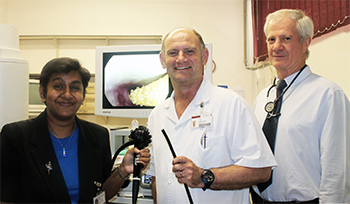Latest News Archive
Please select Category, Year, and then Month to display items
07 March 2025
|
Story Anthony Mthembu
|
Photo Supplied
 Crystal-Donna Roberts, recipient of the 2016 Kovsie Ambassador Award and award-winning actress, has died following a battle with breast cancer.
Crystal-Donna Roberts, recipient of the 2016 Kovsie Ambassador Award and award-winning actress, has died following a battle with breast cancer.
The University of the Free State (UFS) is deeply saddened by the passing of alumna and award-winning actress Crystal-Donna Roberts at the age of 41. According to Eyewitness News (EWN), Roberts passed away during the early hours of 6 March 2025, following a long battle with breast cancer.
The UFS extends its deepest condolences to Roberts’ family, friends, colleagues, and supporters.
Celebrating a beloved actress
Roberts graduated from the UFS with a BA Drama and Theatre Arts degree in 2005 and went on to create work that was beloved across the country and beyond. She starred in the Afrikaans soap opera 7de Laan and shows like Getroud Met Rugby, Montana and Vallei van Sluiers, among others. Her lead role in the film Krotoa earned her the Best Actress award in 2018 at the South African Film and Television Awards (SAFTAs).
Her extensive career in film and television was one of the reasons she was recognised by the UFS with the Kovsie Ambassador Award in 2016. This is an award given to alumni whose accomplishments have not only benefited themselves but their community and the UFS. Although Roberts was well-known for her work on stage and screens, she was also an author. She released her debut novel Speurder Sammi: Die blou steen (Detective Sammi: The Blue Stone) in 2022.
Outpouring of praise
Since the news of Roberts’ passing broke, there has been an outpouring of tributes on social media. Many of her supporters and colleagues have described her as an iconic force who was full of life and inspired many. Alistair Izobell, who starred alongside Roberts in Arendsvlei, responded to the news through a Facebook post which said, “My dearest sister Crystal-Donna Roberts my heart is broken today. You got your wings and your pain is no more. I am thrilled I got to do a chapter of my life with you. I will remember you with the great spirit you were. Now rest sweetly.”
Gastroenterology Unit works to bring a transformative impact to healthcare
2016-11-21

Dr Rita Nathan, Acting CEO of Universitas Hospital,
Prof Willem Kruger, Acting Head of the
School of Medicine, and Prof Jan van Zyl,
Head of Department of Internal Medicine.
Photo: Nonsindiso Qwabe
The departments of Surgery and Internal Medicine at the University of Free State launched the newly upgraded Gastroenterology Unit of the Universitas Academic Hospital on 8 November 2016. Realising the need to provide state-of-the-art equipment that caters for various health needs, the unit has acquired new pieces of equipment worth R7 million. Through the equipment, a move towards the digital revolution, the unit hopes to bring about a transformative impact on healthcare service delivery in central South Africa and its surrounds.
Upgraded unit will make a difference on burden of diseases
Dr Rita Nathan, Acting CEO of the Universitas Hospital, said the increase in the number of scopes, and the improvement in technology, will facilitate improved service delivery to the community of the Free State and beyond. “This upgrade will enable the unit to make a tremendous dent in the burden of diseases in the communities we serve.”
Unit a unique feature in central South Africa
Serving a population from the Free State, Northern Cape, Eastern Cape and Lesotho; the growing demand of health services has led to an increase in the number of patients treated by the unit. This unit is unique in central South Africa as the only one providing endoscopic intervention for cases like gastrointestinal bleeding. It is also the only 24-hour gastroscopic service available in the state sector.
Improved service delivery linked to enhanced training platforms
Prof Willem Kruger, acting head of the School of Medicine, said that the upgrading of equipment will have an immense impact on not only service delivery, but also on training platforms in the latest technologies. “It important, as a university, that our doctors have the latest technology at their disposal to facilitate training. If training improves, service delivery improves. The two on inextricably linked.” he said.